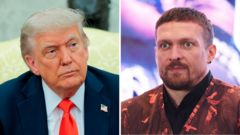As the FTC challenges the past acquisitions, the outcome could redefine Meta’s business structure and shake the social media landscape.
**Meta's Antitrust Battle: Landmark Trial Begins, Could Force Sale of Instagram and WhatsApp**

**Meta's Antitrust Battle: Landmark Trial Begins, Could Force Sale of Instagram and WhatsApp**
A high-stakes antitrust trial against Meta, the owner of Facebook, Instagram, and WhatsApp, has commenced amid allegations of monopolistic practices.
The trial against Meta, initiated by the Federal Trade Commission (FTC), commenced in Washington on Monday. This landmark case revolves around allegations that Meta, already owning Facebook, acquired Instagram in 2012 and WhatsApp in 2014 to stifle competition and secure a monopoly in the social media domain. Despite the FTC's prior approval of these mergers, it is now meticulously examining the ramifications of these acquisitions. If successful, the FTC might compel Meta's CEO, Mark Zuckerberg, to divest Instagram and WhatsApp.
Meta has expressed confidence in its defense and intends to argue that user experiences on Instagram have flourished since the acquisition, thereby suggesting that the merger was beneficial. Antitrust expert Rebecca Haw Allensworth from Vanderbilt Law School notes that the FTC posits that Zuckerberg’s acquisitions were strategic moves to neutralize competitive threats, emphasizing his documented preference for buying rather than competing. Meta's defense is expected to focus on how the acquisitions have ultimately improved services for consumers.
Both Zuckerberg and former COO Sheryl Sandberg are slated to testify in the ongoing trial, which could extend over several weeks. The momentum of this case is further influenced by shifting political dynamics, having been filed during Donald Trump's presidency, with potential ramifications as the political landscape evolves. Reports have surfaced that Zuckerberg personally lobbied Trump to drop the case, demonstrating the intersection of politics and business in this high-profile trial.
The controversy surrounding the case is compounded by Trump’s recent action of dismissing two FTC commissioners, a move deemed by some as politically charged, with implications for the integrity of the FTC as an independent watchdog. Commission members have voiced concerns about potential political interference affecting anti-trust litigation.
As the FTC embarks on this challenging legal journey, analysts have noted the uphill struggle it faces compared to more conclusively established monopolies like Google, recently found to hold a dominant position in online search. Experts indicate that proving Meta’s monopolistic behavior is complex due to the existing competition within personal networking services. In its defense, Meta asserts that its platforms compete with numerous other services, hinting at a bustling market landscape that contradicts monopoly claims.
This trial not only poses substantial implications for Meta but also highlights the landscape of digital monopolies and the power dynamics influencing tech regulation.
Meta has expressed confidence in its defense and intends to argue that user experiences on Instagram have flourished since the acquisition, thereby suggesting that the merger was beneficial. Antitrust expert Rebecca Haw Allensworth from Vanderbilt Law School notes that the FTC posits that Zuckerberg’s acquisitions were strategic moves to neutralize competitive threats, emphasizing his documented preference for buying rather than competing. Meta's defense is expected to focus on how the acquisitions have ultimately improved services for consumers.
Both Zuckerberg and former COO Sheryl Sandberg are slated to testify in the ongoing trial, which could extend over several weeks. The momentum of this case is further influenced by shifting political dynamics, having been filed during Donald Trump's presidency, with potential ramifications as the political landscape evolves. Reports have surfaced that Zuckerberg personally lobbied Trump to drop the case, demonstrating the intersection of politics and business in this high-profile trial.
The controversy surrounding the case is compounded by Trump’s recent action of dismissing two FTC commissioners, a move deemed by some as politically charged, with implications for the integrity of the FTC as an independent watchdog. Commission members have voiced concerns about potential political interference affecting anti-trust litigation.
As the FTC embarks on this challenging legal journey, analysts have noted the uphill struggle it faces compared to more conclusively established monopolies like Google, recently found to hold a dominant position in online search. Experts indicate that proving Meta’s monopolistic behavior is complex due to the existing competition within personal networking services. In its defense, Meta asserts that its platforms compete with numerous other services, hinting at a bustling market landscape that contradicts monopoly claims.
This trial not only poses substantial implications for Meta but also highlights the landscape of digital monopolies and the power dynamics influencing tech regulation.





















